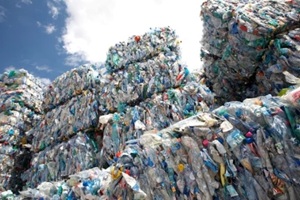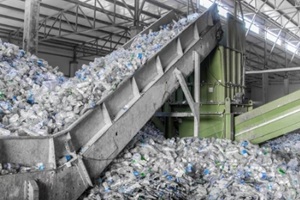April 3, 2025

The United States faces an escalating challenge with the management and disposal of plastic waste generated by society. A new OECD report suggests that by 2060, plastic waste production worldwide could almost triple, with the bulk of it ultimately ending up in landfills or potentially affecting ecosystems.
However, banning plastic outright is neither practical nor effective. Instead, the priority must shift toward repurposing plastic waste into a beneficial resource. The following are actionable strategies organizations should be considering to upgrade recycling infrastructure, implement forward-thinking policies, and foster innovation, setting the stage for a sustainable future in plastic recycling.
At the increasing rate of production and waste, modernizing plastic recycling infrastructure is essential for addressing the growing plastic waste problem in the United States. Newer, more advanced sorting systems powered by AI and robotics can significantly improve recovery rates while reducing contamination.
These technologies actively work to improve precision, allowing recyclables to be processed far more efficiently. Germany’s recycling success, driven by its investment in cutting-edge sorting systems and comprehensive policies, provides a model worth emulating.
A significant number of communities, especially those in rural locations, often struggle with having insufficient plastic recycling options. Expanding curbside recycling programs and increasing the availability of public recycling bins can further boost participation. Strategic investments in these programs can bridge this gap, making it easier for individuals to recycle consistently.
Strong infrastructure serves as the very foundation of any successful recycling initiative. Long-term progress depends on efficient systems that adapt to increasing waste volumes and incorporate innovative technologies. With the right upgrades, recycling can become a powerful tool in managing plastic waste effectively.
Nationwide recycling policies could drive significant progress in managing plastic waste. A federal container redemption program for plastic bottles is a practical step to incentivize recycling. According to the Container Recycling Institute, deposit-bearing bottles are recycled at rates up to three times higher than non-deposit bottles. Implementing such a program across the U.S. could dramatically increase recycling rates while reducing environmental pollution.
Requiring companies to incorporate post-consumer resin (PCR) into their products is another vital policy measure. Mandating regular reporting on PCR usage and recycling efforts would promote transparency and accountability. These measures encourage corporate responsibility and set measurable benchmarks for sustainability.
Standardizing sustainable packaging across industries is equally important, as it supports the broader adoption of recyclable materials while signaling to consumers that businesses are committed to reducing plastic waste. Together, these policies can create a consistent, impactful framework for recycling nationwide.

Lessons from the renewable energy sector demonstrate how targeted investment can spark transformative breakthroughs, turning ambitious ideas into innovative, practical solutions. Increased government funding can accelerate research into advanced recycling technologies and support the creation of sustainable materials.
Small businesses and innovators often bring fresh perspectives to complex challenges, driving progress in unexpected ways. Start-ups focused on scalable waste management solutions should be supported through tax breaks/grants that encourage entrepreneurship and foster a culture where creative problem-solving thrives.
Long-term investments in innovation have far-reaching impacts as new plastic recycling methods and materials reduce dependency on virgin plastics while addressing current inefficiencies in waste management. Building a sustainable future starts with empowering innovators to push boundaries and create solutions that benefit both the environment and the economy.
Expanding the market for recycled plastics is essential when it comes to creating a sustainable economy. Businesses are more likely to integrate recycled materials into their products when provided with economic benefits that encourage adoption.
Lowering the costs associated with PCR integration makes sustainable production an attractive option for manufacturers. Beyond just promoting sustainability, these incentives also serve to stimulate innovation and drive healthy competition.
Transparent labeling, like a straightforward seal showing the PCR content and its percentage, enables consumers to make better-informed purchasing decisions. Increased transparency builds trust and drives demand for products with recycled materials. As more consumers prioritize sustainability, businesses are motivated to adapt and innovate.
California’s CRV system offers a proven model for progress. Expanding this concept nationwide and mandating a minimum of 30% PCR content in plastic production could revolutionize recycling practices while aligning industry goals with environmental priorities.
Join our PLASTICS Pulse newsletter today to receive updates on within the plastic industry while staying informed & connected.
Tackling plastic waste requires a coordinated global effort, which is why sharing best practices and recycling innovations with international partners can accelerate progress and address the worldwide crisis more effectively. Adopting collaborative approaches allows countries to learn from each other’s successes and challenges, cultivating collective advancements in innovative plastic recycling technologies and strategies.
Stricter import and export policies are essential to make sure that recyclable materials are processed responsibly. Through waste reduction and the creation of sustainable frameworks, this approach strengthens the foundation of a global circular economy.
The United States has the opportunity to lead in global recycling initiatives, and by championing partnerships and driving innovation, the nation can best position itself as a pioneer in sustainable waste management, setting an example for the rest of the world to follow.
Educating consumers through improving their awareness is essential for enhancing recycling habits and reducing any resulting contamination. National campaigns can highlight the value of sustainable practices and provide practical tips for proper recycling. Simple, clear messaging helps individuals understand their role in creating a cleaner environment.

Collaboration between corporations and advocacy groups can amplify these efforts. Promoting sustainable supply chains and sharing the long-term benefits of recycling encourages widespread engagement. Companies that communicate their sustainability goals effectively inspire trust and help influence consumer behavior.
Widespread awareness strengthens recycling initiatives at every level. As individuals and businesses recognize the consequences of their actions, collective sustainability efforts grow stronger and more impactful over time.
Improving plastic recycling in the U.S. requires bold innovation, cohesive policies, and strengthened infrastructure. Greater collaboration across industries and borders can help redefine how plastic waste is managed and viewed. Alongside manufacturers and consumers, professionals and trade organizations are key contributors to advancing this process of transformation. Join PLASTICS, the Plastics Industry Association, today to stay informed on emerging technologies and explore membership benefits.
PLASTICS and the Future Leaders in Plastics (FLiP) Committee are devoted to supporting and encouraging the next generation of plastics leaders who will play a crucial role in the innovation, technology and future of the plastics industry. FLiP’s mission is to provide young professionals under the age of 40 the exposure, education and resources they need to build lifelong careers in plastics. Want to join? Want to get your employees involved? Email: [email protected]